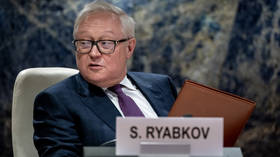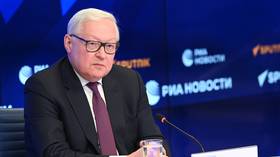Moscow explains withdrawal from landmark arms control deal

Russia’s formal withdrawal from the Treaty on Conventional Armed Forces in Europe (CFE) will not impact regional security, which has already been damaged by the actions of NATO-aligned countries, Deputy Foreign Minister Sergey Ryabkov has said.
In an interview with Russian state-run newspaper Parlamentskaya Gazeta on Monday, Ryabkov pointed to the “paradoxical” situation regarding the post-Cold War agreement which put limits on the number of tanks, armored vehicles, artillery, helicopters, and aircraft stationed in Europe.
Initially signed in 1990, the treaty sought to prevent NATO and the now-defunct Warsaw Pact from amassing forces for a blitzkrieg-type offensive, and establish a military balance between the two.
“The old treaty... has long ceased to correspond to reality,” he said, adding that attempts to update the agreement never really came to fruition “because of the US and other NATO countries, which demanded some concessions from us.”
In the meantime, the US-led military bloc expanded, bypassing restrictions imposed by the treaty, Ryabkov said, adding that by suspending but not exiting the CFE in 2007, Moscow left the door open to restoring the viability of the arms control agreement.
“Western countries had more than enough time to show common sense. But they preferred to follow the path of further NATO expansion and confrontation with Russia,” he said.
Moreover, Sweden and Finland’s push to join NATO amid the Ukraine conflict, which made US troop deployment on the Russian border possible, stripped Moscow of the possibility to remain part of the agreement, he said.
Asked whether Russia’s withdrawal will adversely impact security in Europe, Ryabkov dismissed the notion.
"It [security] has already been corroded by the hostile actions of NATO countries and their clients towards us. The CFE did not really work for many years, so our exit cannot worsen the situation.
He added that the move will also dispel the illusions of those who had still hoped that Russia would return to the treaty. “Due to the changed circumstances, the CFE runs at odds with our security interests. This obvious fact will now have to be recognized in the West as well,” Ryabkov said.
Last week, Russian President Vladimir Putin signed a decree terminating the CFE. Moscow had partially suspended its participation in the treaty in 2007, accusing NATO members of violating the provisions. In 2015, Russia said it would “completely halt” its participation in the agreement as it saw no purpose in remaining.













